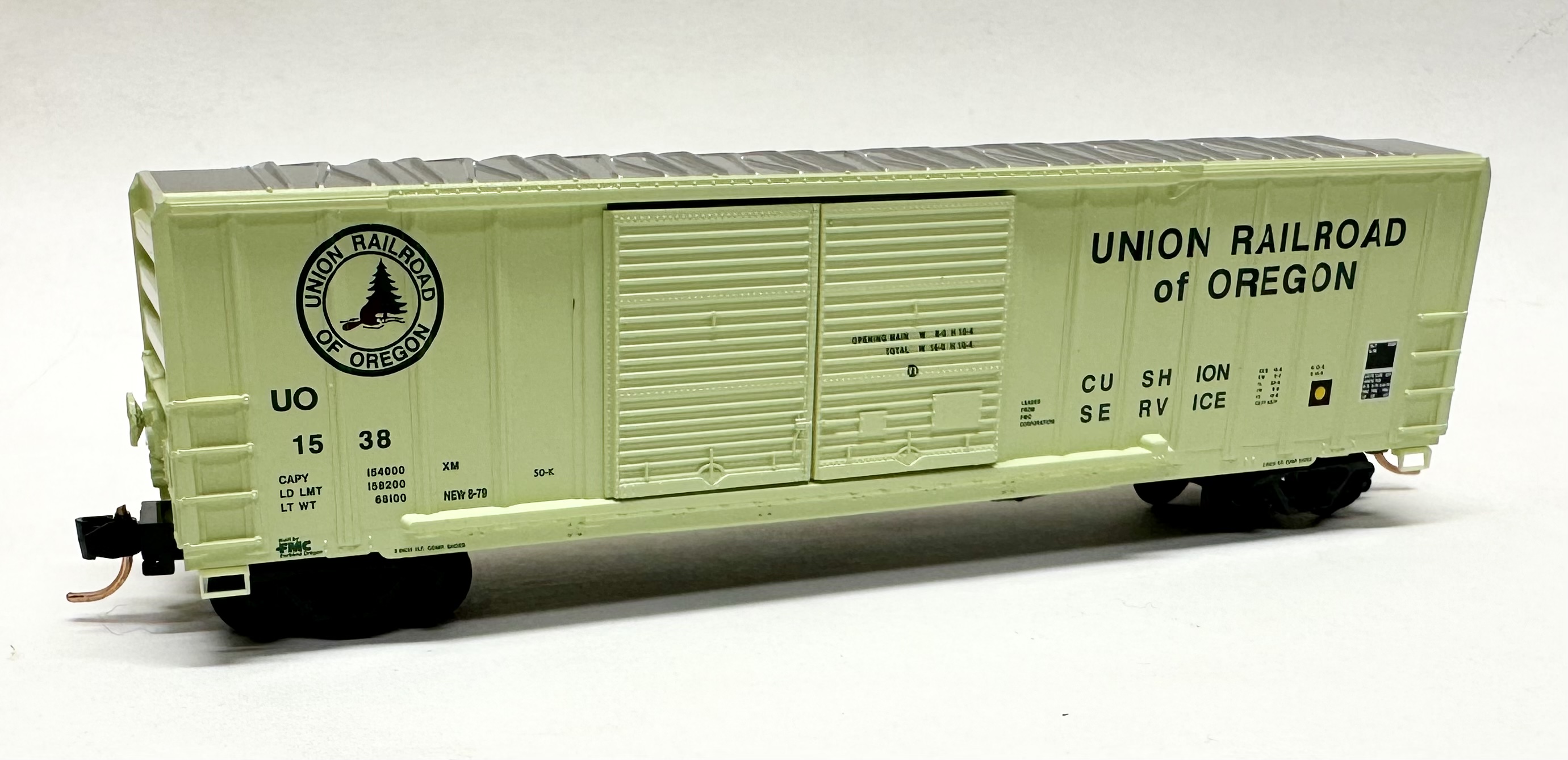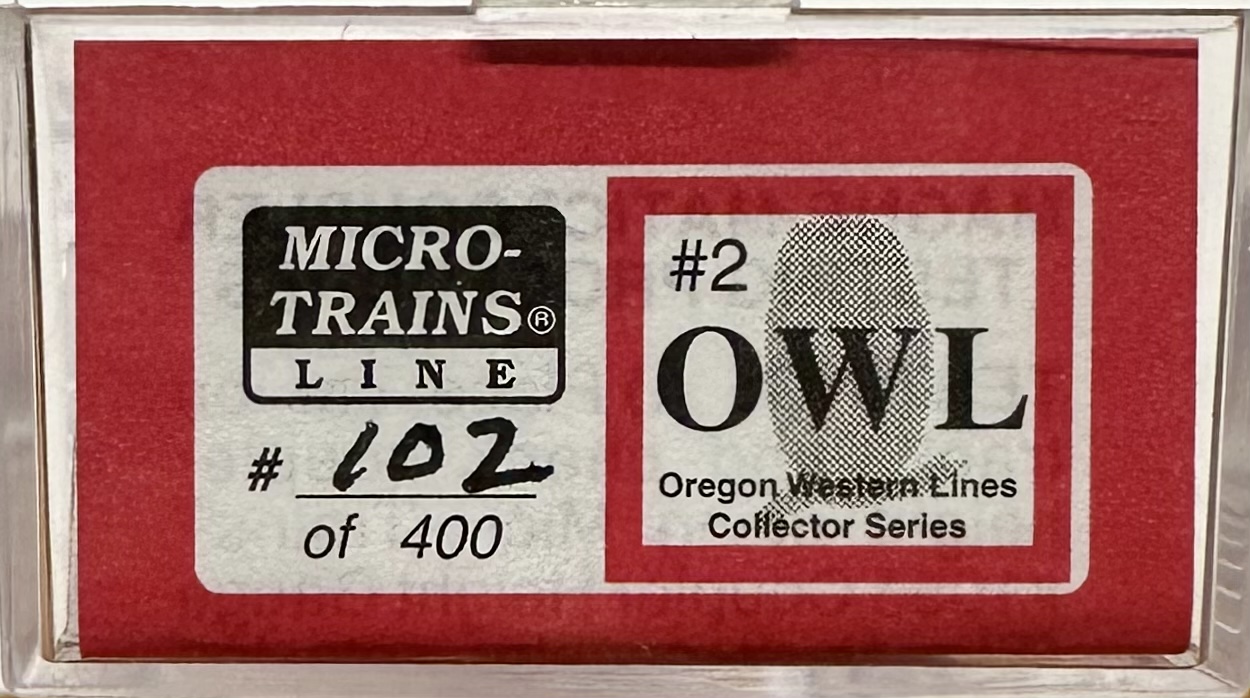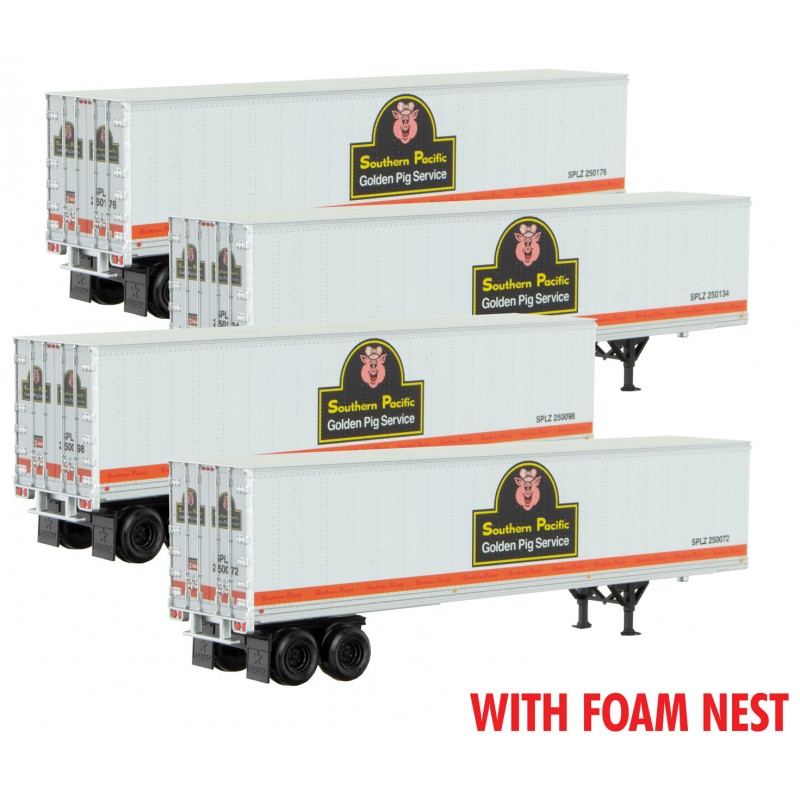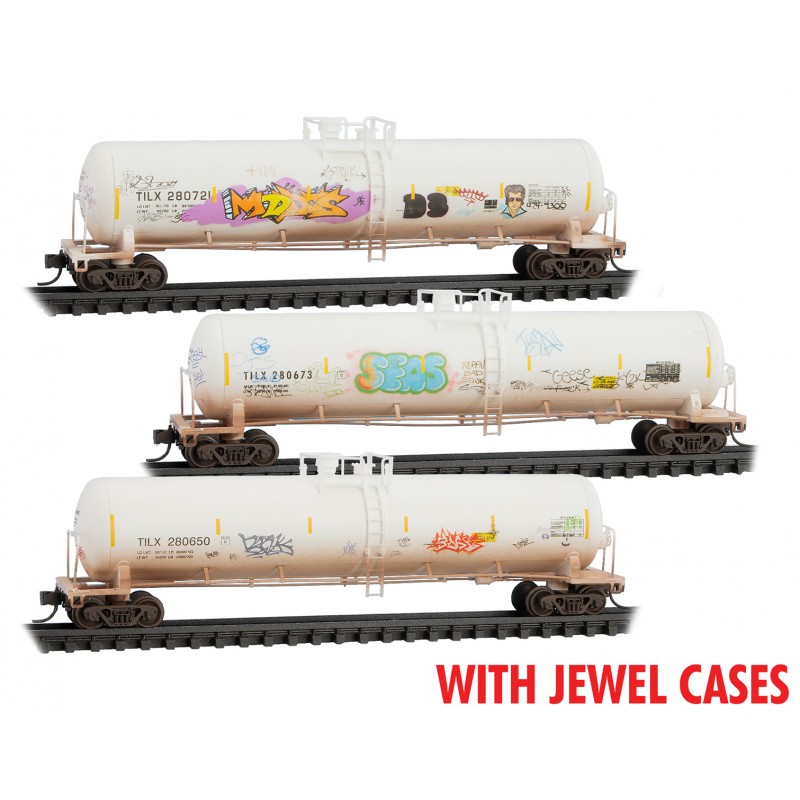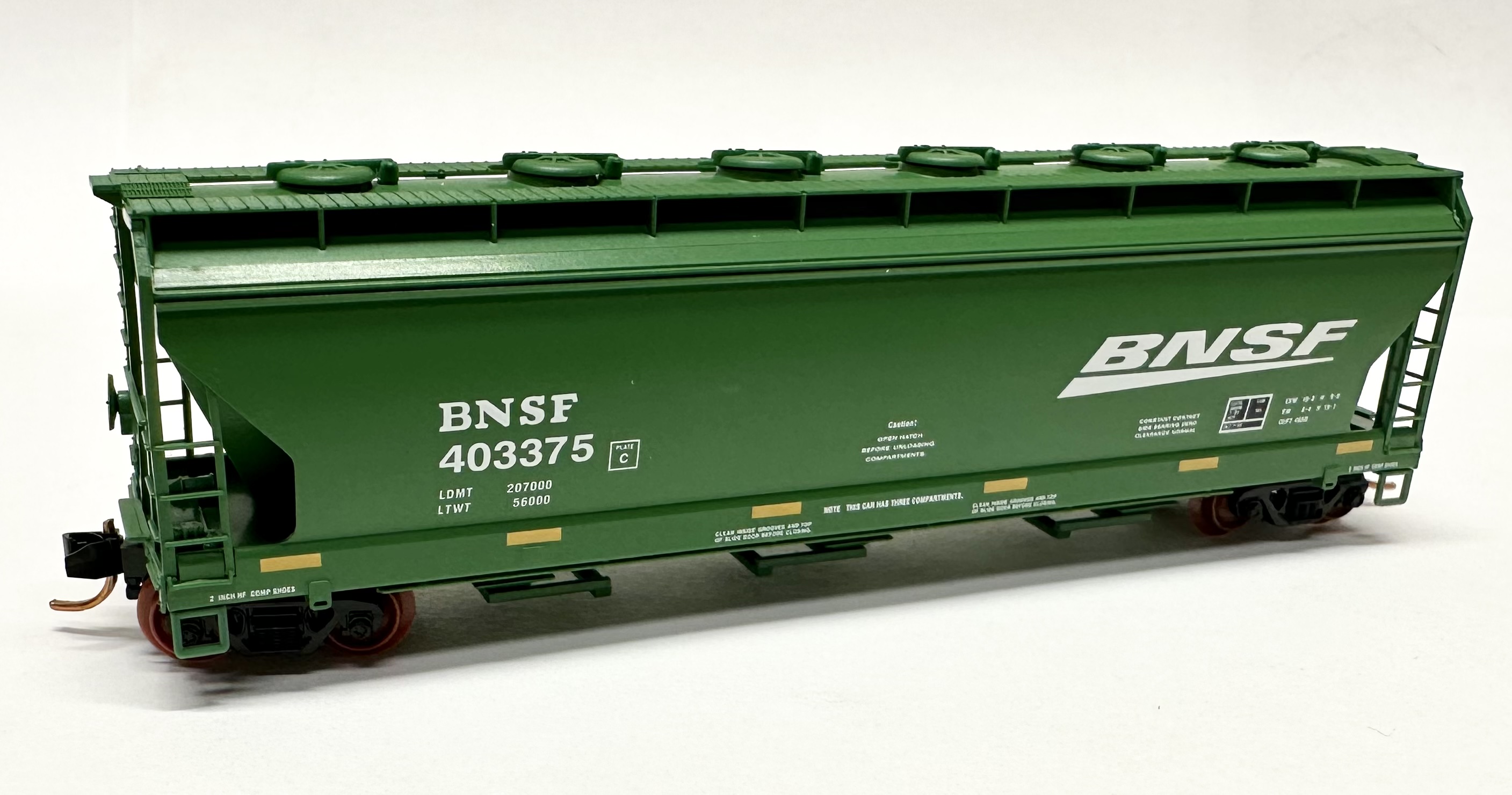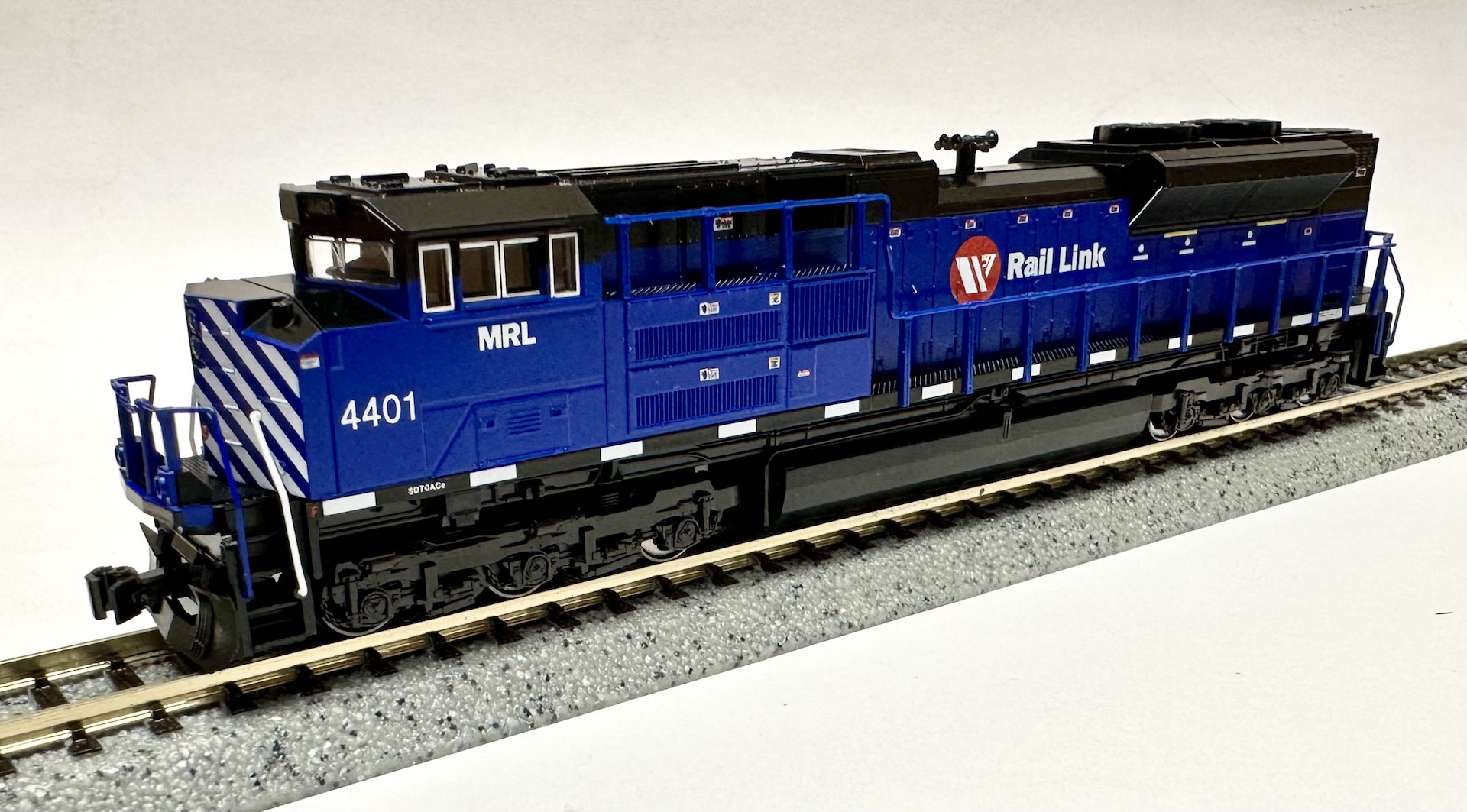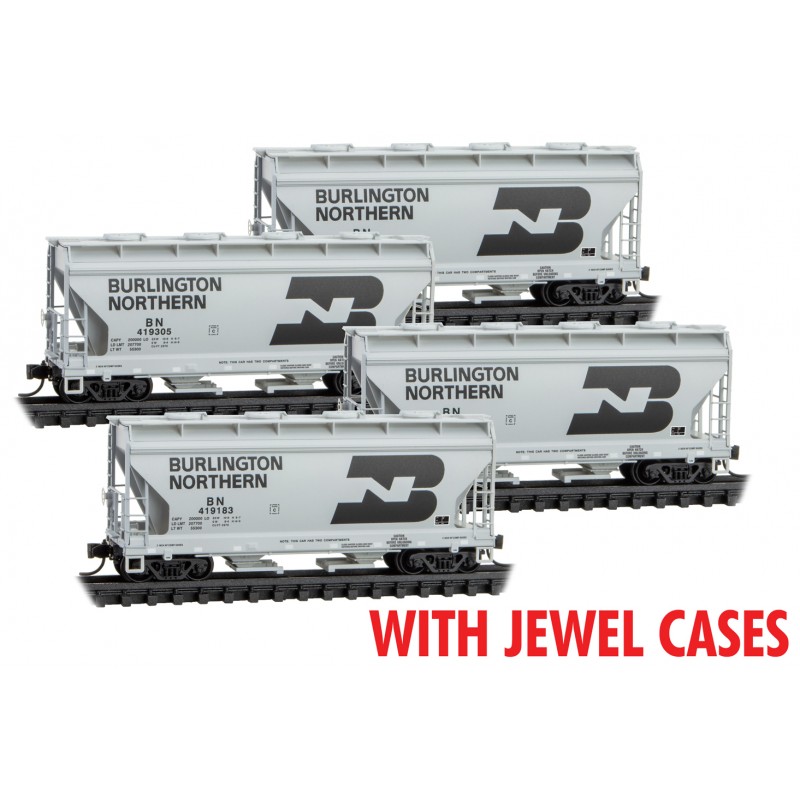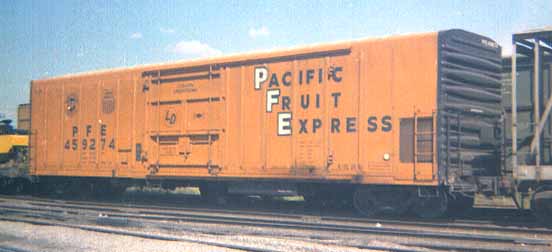Specific Item Information: O.W.L. OWL #2. Only 400 made. Individually numbered.
Model Information: Introduced in May of 1983, Micro-Trains has produced 57 different versions of this car through March of 2016, making it about 1% (or slightly above average) of their production. The car represents a fairly common prototype: 50 foot, double-door, exterior post box car. Like most sliding door models produced by Micro-Trains, the doors on this model do open.
Prototype History: While the 40-foot boxcar was a standard design, and it did come in different setups depending on the type of freight being transported, it was not large enough for efficient mass commodity transportation. The 50-foot boxcar made its first appearance in the 1930s and steadily grew in popularity over the years, which further improved redundancies by allowing for even more space within a given car. Today, the 50-footer remains the common boxcar size. After the second world war ended, and steel became once again readily available, steel became the go-to choice for construction of boxcars. Pullman Standard and ACF were some of the most prolific builders of these cars.
These cars came in many variations. For instance, double-doors became practical for large/wide loads, end-doors useful for very large lading such as automobiles, and interior tie-down equipment was helpful in keeping sensitive products from being damaged in-transit. In 1954 the Santa Fe developed its "Shock Control" (and later "Super Shock Control") technology for new boxcars with upgraded suspension systems to further improve the ride-quality and reduce the chance of damaging freight.
In the 1960s, the flush, "plug" style sliding door was introduced as an option that provides a larger door to ease loading and unloading of certain commodities. The tight-fitting doors are better insulated and allow a car's interior to be maintained at a more even temperature.
These cars came in many variations. For instance, double-doors became practical for large/wide loads, end-doors useful for very large lading such as automobiles, and interior tie-down equipment was helpful in keeping sensitive products from being damaged in-transit. In 1954 the Santa Fe developed its "Shock Control" (and later "Super Shock Control") technology for new boxcars with upgraded suspension systems to further improve the ride-quality and reduce the chance of damaging freight.
In the 1960s, the flush, "plug" style sliding door was introduced as an option that provides a larger door to ease loading and unloading of certain commodities. The tight-fitting doors are better insulated and allow a car's interior to be maintained at a more even temperature.
Road Name History: 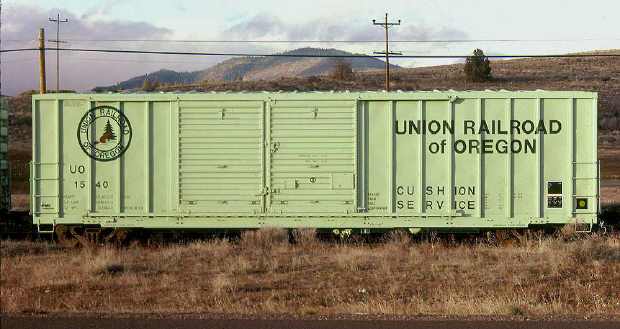 The UO was established in 1927 to takeover 2.2 miles of the failed Central Railroad of Oregon running from the town of Union to a connection with Oregon-Washington Railroad & Navigation Company (a subsidiary of Union Pacific) at Union Junction. UO opened with a 4-4-0 built in 1883. It was retired in 1938 and UO was dieselized with a 26-ton Plymouth that was already more than a decade old. There had been another Plymouth on the property as early as 1936 but little is known about this engine. The 26-tonner worked the UO exclusively for 40 years.
The UO was established in 1927 to takeover 2.2 miles of the failed Central Railroad of Oregon running from the town of Union to a connection with Oregon-Washington Railroad & Navigation Company (a subsidiary of Union Pacific) at Union Junction. UO opened with a 4-4-0 built in 1883. It was retired in 1938 and UO was dieselized with a 26-ton Plymouth that was already more than a decade old. There had been another Plymouth on the property as early as 1936 but little is known about this engine. The 26-tonner worked the UO exclusively for 40 years.
By the 1970s, UO had three customers, a feed mill, a coal dealer, and a sawmill. The latter produced most of the traffic (lumber and wood chips.) UO’s two employees would make two round trips per day between Union and Union Junction. When they weren’t running, they worked as freight agent, locomotive maintainer and section gang. In 1979, they acquired a second switcher, this time a much larger one – a 35-ton Plymouth built in 1936. In 1989, the sawmill in Union closed, as did the Union Railroad of Oregon. In 1995, it was officially abandoned in place.

By the 1970s, UO had three customers, a feed mill, a coal dealer, and a sawmill. The latter produced most of the traffic (lumber and wood chips.) UO’s two employees would make two round trips per day between Union and Union Junction. When they weren’t running, they worked as freight agent, locomotive maintainer and section gang. In 1979, they acquired a second switcher, this time a much larger one – a 35-ton Plymouth built in 1936. In 1989, the sawmill in Union closed, as did the Union Railroad of Oregon. In 1995, it was officially abandoned in place.
Brand/Importer Information: Micro-Trains is the brand name used by both Kadee Quality Products and Micro-Trains Line. For a history of the relationship between the brand and the two companies, please consult our Micro-Trains Collector's Guide.
Manufacturer Information:  Micro-Trains Line split off from Kadee Quality Products in 1990. Kadee Quality Products originally got involved in N-Scale by producing a scaled-down version of their successful HO Magne-Matic knuckle coupler system. This coupler was superior to the ubiquitous 'Rapido' style coupler due to two primary factors: superior realistic appearance and the ability to automatically uncouple when stopped over a magnet embedded in a section of track. The success of these couplers in N-Scale quickly translated to the production of trucks, wheels and in 1972 a release of ready-to-run box cars.
Micro-Trains Line split off from Kadee Quality Products in 1990. Kadee Quality Products originally got involved in N-Scale by producing a scaled-down version of their successful HO Magne-Matic knuckle coupler system. This coupler was superior to the ubiquitous 'Rapido' style coupler due to two primary factors: superior realistic appearance and the ability to automatically uncouple when stopped over a magnet embedded in a section of track. The success of these couplers in N-Scale quickly translated to the production of trucks, wheels and in 1972 a release of ready-to-run box cars.
Micro-Trains Line Co. split off from Kadee in 1990 to form a completely independent company. For this reason, products from this company can appear with labels from both enterprises. Due to the nature of production idiosyncrasies and various random factors, the rolling stock from Micro-Trains can have all sorts of interesting variations in both their packaging as well as the products themselves. When acquiring an MTL product it is very important to understand these important production variations that can greatly enhance (or decrease) the value of your purchase.
Please consult our Micro-Trains Collector's Guide

Micro-Trains Line Co. split off from Kadee in 1990 to form a completely independent company. For this reason, products from this company can appear with labels from both enterprises. Due to the nature of production idiosyncrasies and various random factors, the rolling stock from Micro-Trains can have all sorts of interesting variations in both their packaging as well as the products themselves. When acquiring an MTL product it is very important to understand these important production variations that can greatly enhance (or decrease) the value of your purchase.
Please consult our Micro-Trains Collector's Guide
Commissioner Information: Thinking Ventures is located at Box 262, Canyon City, Oregon.
Item created by: gdm on 2018-03-03 11:38:08. Last edited by grothe77 on 2023-10-03 11:10:06
If you see errors or missing data in this entry, please feel free to log in and edit it. Anyone with a Gmail account can log in instantly.
If you see errors or missing data in this entry, please feel free to log in and edit it. Anyone with a Gmail account can log in instantly.


